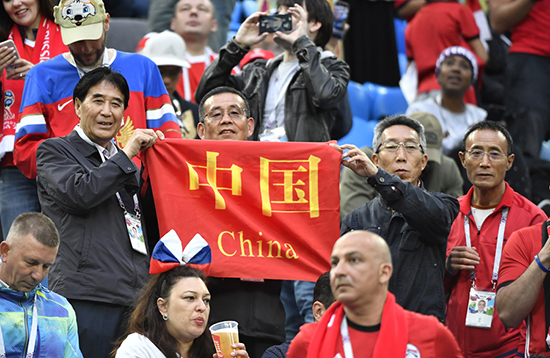


Chinese soccer fans display their loyalty during the match between Russia and Egypt in St. Pertersburg, Russia, on June 19. [Photo/Xinhua]
Football, pardon me, soccer is a team game. Had it not been so, a Lionel Messi or a Cristiano Ronaldo alone would have been able to lead Argentina or Portugal to World Cup glory.
Unlike tennis, badminton, ping-pong and sundry other sports, soccer is not only a team game but also bound by time. You have 90 minutes and the injury time to win unless it is a knockout game, in which you have an added 30 minutes divided into 15-minute halves-followed by the dreaded penalty shootout if there is no winner-to produce a winner.
Of course, even if you have a team of individual stars but no coordination and cohesion, you are doomed unless "luck" comes to your rescue. Think Argentina in the ongoing World Cup. Truly, a team of world beaters-think Messi, Angel Di Maria, Sergio Aguero, Paulo Dybala, Giovanni Lo Celso and Gonzalo Higuain.
Still, something went wrong. Team spirit. And a coach without a vision.
Plus, Di Maria, Aguero, Dybala and Celso are prone to trespassing on Messi's space. Dybala plays in exactly in the same position as Messi for Juventus. Di Maria is most penetrative when he cuts in from wide areas on the left to Messi's territory. Even Aguero, a conventional center forward, drifts into Messi's space before moving forward at full speed.
And Lo Celso, considered heir apparent to Messi, prefers to play in the same area as the Barcelona star.
Soccer is not about individual brilliance alone. It is the sum total of 11 players. Of course, individual brilliance can win some games. But in these days of computer planning and mathematical permutations and combinations, it can take a team so far and no further.
No doubt, money can draw the best of players from across the world to a country's soccer league. But if the presence of great players in its soccer league could guarantee success for a country in world soccer, England, Spain, Germany and Italy would have won all the World Cups. True, Germany, Italy, England and Spain have won 10 World Cups among them. But that is not because of their soccer leagues. Their success is attributable to their programs to nurture budding soccer players, by catching 'em young.
Perhaps the ongoing World Cup has a vital message for China, whose domestic soccer league is one of the most lucrative for some top world players, many of whom are past their prime. Not many of Uruguay's top players ply their trade in the Uruguayan soccer league, but the relatively small Latin American country has all that it takes to produce top players and make the country a name to reckon with in world soccer. Brazil and Argentina may be better than Uruguay in terms of recent records but in those two countries soccer is a passion, a way of life.
Until the right atmosphere is created for the development of soccer in China-for example, by providing more playing fields and establishing proper training programs for youngsters-no matter how much money is spent on the Chinese Super League, China cannot expect to become a superpower in world soccer.
 Fire brigade in Shanghai holds group wedding
Fire brigade in Shanghai holds group wedding Tourists enjoy ice sculptures in Datan Town, north China
Tourists enjoy ice sculptures in Datan Town, north China Sunset scenery of Dayan Pagoda in Xi'an
Sunset scenery of Dayan Pagoda in Xi'an Tourists have fun at scenic spot in Nanlong Town, NW China
Tourists have fun at scenic spot in Nanlong Town, NW China Harbin attracts tourists by making best use of ice in winter
Harbin attracts tourists by making best use of ice in winter In pics: FIS Alpine Ski Women's World Cup Slalom
In pics: FIS Alpine Ski Women's World Cup Slalom Black-necked cranes rest at reservoir in Lhunzhub County, Lhasa
Black-necked cranes rest at reservoir in Lhunzhub County, Lhasa China's FAST telescope will be available to foreign scientists in April
China's FAST telescope will be available to foreign scientists in April "She power" plays indispensable role in poverty alleviation
"She power" plays indispensable role in poverty alleviation Top 10 world news events of People's Daily in 2020
Top 10 world news events of People's Daily in 2020 Top 10 China news events of People's Daily in 2020
Top 10 China news events of People's Daily in 2020 Top 10 media buzzwords of 2020
Top 10 media buzzwords of 2020 Year-ender:10 major tourism stories of 2020
Year-ender:10 major tourism stories of 2020 No interference in Venezuelan issues
No interference in Venezuelan issues
 Biz prepares for trade spat
Biz prepares for trade spat
 Broadcasting Continent
Broadcasting Continent Australia wins Chinese CEOs as US loses
Australia wins Chinese CEOs as US loses